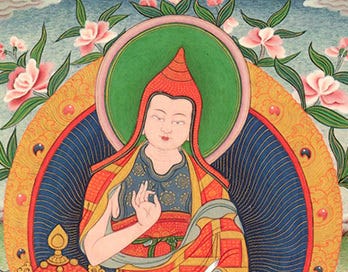Note: This is a 6-part series. See the introduction to the series for links to other posts in this series.
In a related teaching to the Buddha's parable of the two arrows, Shantideva, an 8th-century CE philospher and monk, said:
"Where would I find enough leather
to cover the entire surface of the earth?
But with leather soles beneath my feet,
It’s as if the whole world has been covered."
Shantideva was speaking of the seemingly endless evils in the world around us. The idea is to tend to what we can — which is often most immediately our internal mental processing, or the second arrow of mental pain. It's practical, it's pragmatic. Why hold our mental happiness hostage on the condition that the entire world be fixed first?
This inward-looking focus, however, is a common critique of "modern" forms of mindfulness as mental narcotics meant to inure us to the pains and injustices of the world. In the workplace, it can be seen as shifting the burden of happiness onto the individual and diverting attention away from fixing toxic systems.1
Take climate change as another pertinent example: this is literally a global problem. Is the solution a systemic one, analogous "covering the entire surface of the earth with leather" in Shantideva's parlance, or simpler local ones analogous to fashioning sandals that protect only our feet?2
One could argue that the truly holistic view is that to choose happiness is to work collectively to resist the tragedy of the commons. But the stark fact is that many people are perfectly happy with local, pragmatic solutions that ignore larger systemic problems. People are all too happy to pour money into securing their own individual happiness.3
Does our happiness mean we become complacent about the suffering of those around us? Does personal happiness mean we are willing to accept the suffering in an interconnected world? Every day we are faced with countless questions of this sort: do I eat meat or not? What do I do about the high energy consumption of commerce that I depend on for my food and entertainment? Is the cleanliness of my city street dependent on herding homeless people to distant lands? Oftentimes we don’t even have much choice: the larger the problem, the more often the decisions are delocalized from us (e.g. decisions made by government or corporations).
The scariest of all is that, in this modern world, we are all more powerful than we have ever been in human history, sometimes frighteningly so. With the push of a button and the cost of a premium laptop,4 you can literally save a child's life. But does it make you happy? If so, how durable is that happiness? The scary realization is that saving a child's life by pushing a button probably does nothing emotionally for most people.
We can all come up with elaborate fancy narratives of how our money and energy is better spent elsewhere than that child's life and how we can be happier doing something else while improving the world. Another related argument: “once I take care of my life and am completely satisfied then I will have the bandwidth to help others.” But if we are honest, how systematic and internally consistent are these arguments? Or are they simply bromides that are just muddled enough to avoid easy dissection, and obtuse enough to give us the intellectual cover to be happy in a world in pain?5 If we are sated do we stop caring? Does being happy imply anything about our acceptance of pain and evil? What are the limits of the Boddhisattva vow?6
This kind of mindfulness is oftentimes called “McMindfulness.”
One can also take the metaphor too far and think of other analogous solutions: don't walk on the surface of the earth (*cough* space billionaires *cough*) etc...
My most personal experience with this is seeing apartment buildings in the heart of LA with fancy rooftop exercise centers so that residents would never have to run on the dirty city streets. And so public parks languish.
$2300, to be specific. Also, see these organizations, or this analysis. Interesting and uncomfortable thought experiment: what is your emotional response and willingness to donate upon hearing if the cost of saving a life is $10 vs $100 vs $1000? My guess is $10 seems too cheap and might make you feel shitty that your chipotle burrito also costs $10. Meanwhile $1000 is starting to get expensive for most people such that you have plausible justification to not donate. $100 might be the sweet spot to get most people to think of donation as a “worthy” and practical thing to do.
You might object, it's not that you are happy with a world in pain, it's simply that you are happy despite a world in pain. That seems like semantics meant only to make one feel better about oneself. Either way, it is fact that we coexist with others’ pain in the world, and the implications of this merits more analysis.
The Boddhisattva vows were first made vivid to me via the nobility of 地藏王 (or Jizo, or Kṣitigarbha). It may well be that questions of the limits of the vow for this life on earth is only meant for asking but not for answering. E.g. take the Serenity Prayer by Reinhold Niebuhr: “God, grant me the Serenity, to accept the things I can not change, Courage to change the things I can, and Wisdom to know the difference.”



